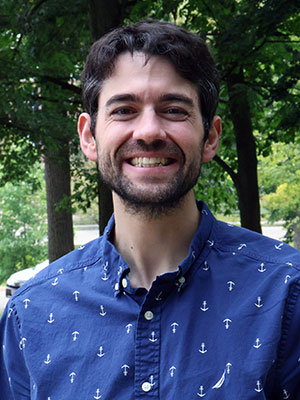 Assistant Professor of Psychology
Assistant Professor of Psychology
Behavioral Neuroscience
Blair Hall 110
beachern@wittenberg.edu
Nicholas J. Beacher, Ph.D., joined the Wittenberg faculty in 2025. Prior to this, Dr. Beacher earned his M.S. (2018) and Ph.D. (2020) in Psychology: Behavioral & Systems Neuroscience at Rutgers University where he studied ultrasonic vocalizations and in vivo electrophysiology in rats self-administering drugs of abuse with Dr. Mark West. Dr. Beacher recently worked as a postdoctoral fellow (2020-2025) in the Neural Engineering Section of the Behavioral Neuroscience Research Branch within the National Institute on Drug Abuse (NIDA), Intramural Research Program at the National Institutes of Health (NIH) under the guidance of Dr. Da-Ting Lin (and co-mentored by Dr. Yavin Shaham). At NIDA, he worked to design a custom miniaturized head-mounted microscope (miniscope) + gradient index lens imaging system for recording 100s of individual neurons simultaneously in the nucleus accumbens of awake, behaving rats. Dr. Beacher also developed custom approaches for operant behavior, multi-dimensional video recording, and long-term retention of miniscope imaging.
Dr. Beacher simultaneously earned the Center on Compulsive Behavior (CCB) award at NIDA and a Fellows Award for Research Excellence (FARE). Dr. Beacher takes immense pride in commitment to mentoring and development of his student mentees. Dr. Beacher’s mentees included postbaccalaureate, undergraduate, and high school students who earned fellowship awards and/or were included as co-authors on Dr. Beacher’s research papers. All students progressed to the next phase in their dream career goals (i.e., graduate or medical school). Dr. Beacher was honored as the sole recipient of the 2024 NIDA Postdoctoral Fellow Mentoring Award because of this commitment to teaching, training, and mentoring students. His current research uses in vivo miniscope imaging, chemogenetic manipulations, ultrasonic vocalizations, and deep learning neurobehavioral analyses to uncover contributions to addiction, motivation, and effort. Please see google scholar page for full publication history.
Recent publications under the Wittenberg affiliation:
- Beacher, N. J., Wang, M. W., Iringan, J. S. J., Clark, C. E., Ginevra, D. O., Broomer, M. C., & Lin, D. T. (2025). Drug Self-Administration, Drug-Specific Behaviors, and Neurobehavioral Deep Learning Analyses. Addiction Neuroscience, 100222.
- Broomer, M. C., Clark, C. E., Iringan, J. S. J., Wang, M. W., Beacher, N. J., & Lin, D. T. (2025). Using miniscopes and deep learning to compare neurobehavioral representations of psychostimulant and opioid self-administration. Addiction Neuroscience, 100224.
Additional selected recent publications:
- Beacher, N. J., Wang, M. W., Broomer, M. C., Kuo, J. Y., Washington, K. A., Targum, M., ... & Lin, D. T. (2025). Miniscope imaging of nucleus accumbens neural activity in freely behaving rats: Virus injection, gradient index lens implantation, recording strategies, and analytical methods. Current Protocols, 5(1), e70090.
- Glanzberg, J. T., Denman, A. J., Beacher, N. J., Broomer, M. C., Liang, B., Li, Y., ... & Lin, D. T. (2024). Individual differences in prelimbic neural representation of food and cocaine seeking. Cell reports, 43(12).
- Beacher, N. J., Wang, M. W., Broomer, M. C., Kuo, J. Y., & Lin, D. T. (2024). Minibox: Custom solo or semi-group housing chambers for long term housing of rats with miniscopes. MethodsX, 13, 102921.
- Broomer, M. C., Beacher, N. J., Wang, M. W., & Lin, D. T. (2024). Examining a punishment-related brain circuit with miniature fluorescence microscopes and deep learning. Addiction Neuroscience, 11, 100154.
- Beacher, N. J., Kuo, J. Y., Targum, M., Wang, M., Washington, K. A., Barbera, G., & Lin, D. T. (2024). A modular, cost-effective, versatile, open-source operant box solution for long-term miniscope imaging, 3D tracking, and deep learning behavioral analysis. MethodsX, 12, 102721.

